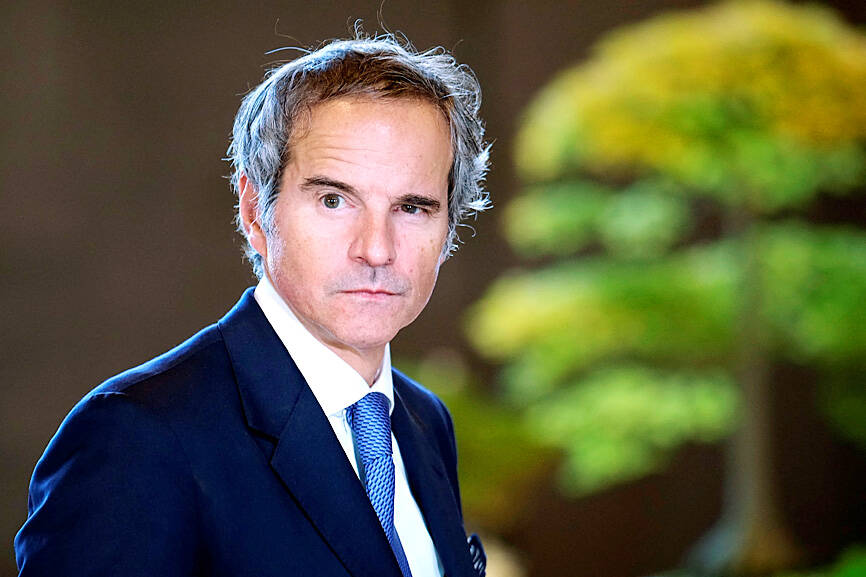Japan’s plan to release treated wastewater from the Fukushima Dai-ichi nuclear power plant disaster site is in line with global safety standards, the International Atomic Energy Agency (IAEA) said after completing a two-year review.
The agency found the proposals for “controlled, gradual discharges of the treated water” into the Pacific Ocean “would have a negligible radiological impact on people and the environment,” IAEA Director-General Rafael Grossi said in a foreword to a report handed yesterday to Japanese Prime Minister Fumio Kishida.
IAEA officials would continue to review the release of the wastewater and conduct live monitoring.

Photo: Reuters
The conclusion of the agency’s study enables Japan “to take the decisions that you may wish to take to continue and move on to the next phase,” Grossi said as he met with Kishida.
An assessment of the discharge facility by a domestic nuclear regulator is still required before a timeline is finalized to begin releasing the water — equivalent in volume to about 500 Olympic-size swimming pools.
Japanese government officials have said that the discharges, which could take decades, would begin during the summer.
“I will not allow a release that would harm people or the environment in Japan or around the world,” Kishida told reporters. “I will continue to explain carefully at home and abroad, on a scientific basis and with a high degree of transparency.”
The proposal has been harshly criticized by China’s government, sparked public protests in South Korea, and faces opposition from some local residents and members of Japan’s fishing industry. Cosmetics brands to seafood exporters are among those to have been targeted with potential boycotts.
China again urged Japan to stop the plan to discharge the contaminated water, the Chinese Ministry of Foreign Affairs said in a statement yesterday.
China also expressed regret at the IAEA report endorsing the plan.
Tokyo Electric Power Co (Tepco), which operates the nuclear power plant, cycles in water to keep fuel and debris cool at the disaster site.
That contaminated water is processed to remove most radioactive elements, except tritium, which is more difficult to eliminate at low concentrations.
The liquid is stored in about 1,000 tanks and Tepco plans to further dilute the waste with seawater before releasing it off the coast through a tunnel.
The Japanese government and Tepco have said that removing the wastewater and storage tanks is necessary to allow full decommissioning of the nuclear plant, which suffered a meltdown in 2011.
“This process of dilution, and chemical and other filtering, is nothing new, it’s something that exists in the industry,” Grossi said in a separate briefing in Tokyo.

A Chinese aircraft carrier group entered Japan’s economic waters over the weekend, before exiting to conduct drills involving fighter jets, the Japanese Ministry of Defense said yesterday. The Liaoning aircraft carrier, two missile destroyers and one fast combat supply ship sailed about 300km southwest of Japan’s easternmost island of Minamitori on Saturday, a ministry statement said. It was the first time a Chinese aircraft carrier had entered that part of Japan’s exclusive economic zone (EEZ), a ministry spokesman said. “We think the Chinese military is trying to improve its operational capability and ability to conduct operations in distant areas,” the spokesman said. China’s growing

Nine retired generals from Taiwan, Japan and the US have been invited to participate in a tabletop exercise hosted by the Taipei School of Economics and Political Science Foundation tomorrow and Wednesday that simulates a potential Chinese invasion of Taiwan in 2030, the foundation said yesterday. The five retired Taiwanese generals would include retired admiral Lee Hsi-min (李喜明), joined by retired US Navy admiral Michael Mullen and former chief of staff of the Japan Self-Defense Forces general Shigeru Iwasaki, it said. The simulation aims to offer strategic insights into regional security and peace in the Taiwan Strait, it added. Foundation chair Huang Huang-hsiung

PUBLIC WARNING: The two students had been tricked into going to Hong Kong for a ‘high-paying’ job, which sent them to a scam center in Cambodia Police warned the public not to trust job advertisements touting high pay abroad following the return of two college students over the weekend who had been trafficked and forced to work at a cyberscam center in Cambodia. The two victims, surnamed Lee (李), 18, and Lin (林), 19, were interviewed by police after landing in Taiwan on Saturday. Taichung’s Chingshui Police Precinct said in a statement yesterday that the two students are good friends, and Lin had suspended her studies after seeing the ad promising good pay to work in Hong Kong. Lee’s grandfather on Thursday reported to police that Lee had sent

BUILDUP: US General Dan Caine said Chinese military maneuvers are not routine exercises, but instead are ‘rehearsals for a forced unification’ with Taiwan China poses an increasingly aggressive threat to the US and deterring Beijing is the Pentagon’s top regional priority amid its rapid military buildup and invasion drills near Taiwan, US Secretary of Defense Pete Hegseth said on Tuesday. “Our pacing threat is communist China,” Hegseth told the US House of Representatives Appropriations Subcommittee on Defense during an oversight hearing with US General Dan Caine, chairman of the Joint Chiefs of Staff. “Beijing is preparing for war in the Indo-Pacific as part of its broader strategy to dominate that region and then the world,” Hegseth said, adding that if it succeeds, it could derail